1. What does SAP stand for? The basic definition of SAP ERP solution
SAP is a market leader in enterprise application software, helping companies of all shapes and sizes in all industries run effectively by ERP solutions. The company was founded in 1972 in Walldorf, Germany. With over 105,000 employees and over 24,000 implementing partners globally, SAP has created over 100 solutions, serving over 280 million users in 188 countries.
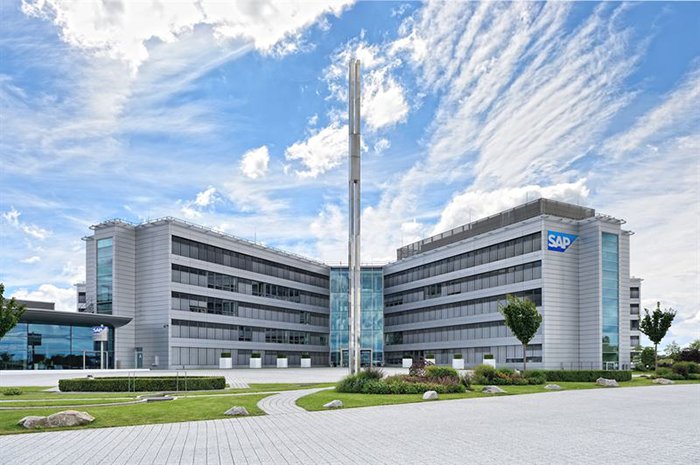 SAP is the name of a company specializing in providing the world's leading ERP solutions in Germany
SAP is the name of a company specializing in providing the world's leading ERP solutions in Germany
SAP's ERP solution (Enterprise Resource Planning), launched in 2006, is a comprehensive solution that has been extensively adopted across various business sectors. It is widespread utilization underscores its pivotal role in modern business operations.
As an enterprise's 'central brain' system, ERP integrates and synchronizes substantial volumes of data from fundamental business processes, including manufacturing, finance, human resources, sales, and supply chain management. By facilitating this data to a uniform system, SAP ERP significantly helps businesses optimize their operation and elevate overall business efficiency.
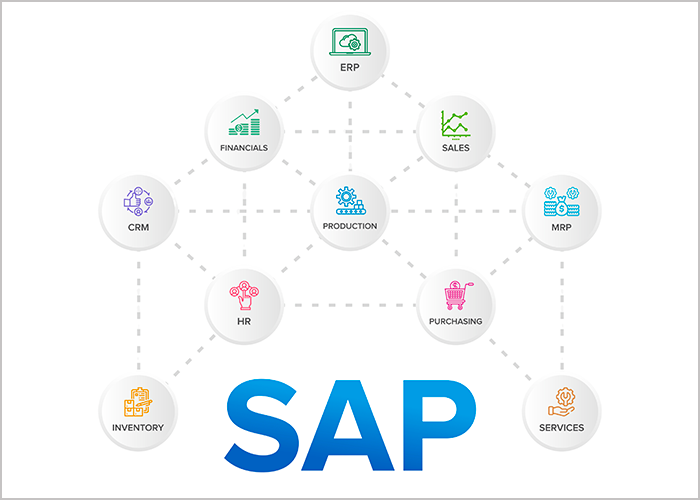 SAP provides a comprehensive, flexible ecosystem
SAP provides a comprehensive, flexible ecosystem
The SAP solution has an adaptable implementation framework, including on-premises, cloud computing, and a hybrid approach (a combination of on-premises and cloud methodologies). The implementation strategy must be aligned with the business's demands and goals to ensure optimal outcomes. This flexibility allows businesses to choose the most suitable deployment method.
2. How are SAP function solutions built for your enterprise?
The SAP ERP system stands out as a comprehensive management system, offering a multitude of crucial functions that are uniquely tailored to your enterprise's needs:
2.1 Data Management: SAP ERP system's data management is fortified with advanced security measures, specifically designed to protect your critical data. It employs restricted data access, backed by an integrated firewall security system, and consolidates data into a unified standard system, ensuring consistency across all levels. This consolidation allows your business to efficiently monitor operations and accelerate decision-making processes, thereby enhancing your business agility and responsiveness.
2.2 Financial Management: SAP reasonably organizes the efficiency of financial management processes, including transactions, analysis, planning, and enterprise risk management. Moreover, the system provides robust support to organizations in assessing sales performance, managing receivables, and addressing non-performing assets, bad debts, and expenses.
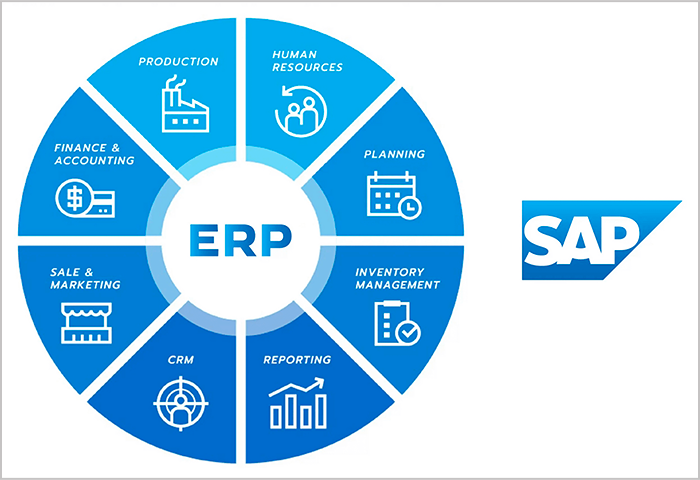 �SAP ERP has many features to support effective enterprise resource management
�SAP ERP has many features to support effective enterprise resource management
2.3 Production Management: SAP offers solutions for the design process and life cycle management, integrating advanced features in production engineering, product operations, and product quality management. To apply SAP's solution, enterprises must effectively streamline their production processes and address disruptions in the production chain.
2.4 Purchasing and Sales Management: In procurement, SAP is equipped with functionalities that facilitate the management of orders, inventory, and financial transactions. Moreover, it assists businesses in administering purchase agreements and systematically organizing sales data to help the entire procurement and sales process operate closely.
2.5 Supply Chain Management (SCM): The integration of modules such as sales review, purchasing, inventory shipping orders, warehouse, and inventory management, SAP brings a comprehensive overview of the entirety of activities according to the supply chain.
2.6 Master Service Agreement (MSA) and Data Management: SAP features such as the Master Service Agreement and data management, service department management, subscription order management, etc., help ensure that service outcomes are profitable.
Besides these functions, SEP ERP also has many powerful features, such as project management, human resource management, and customer relationship management…
3. Outstanding Benefits of SAP ERP Solution
3.1 Comprehensive business management
SAP ERP authorizes a unified platform for all departments within an organization to access and manage data. By integrating a unified system for data storage and usage, SAP ERP establishes a cohesive database environment, significantly reducing information dispersal.
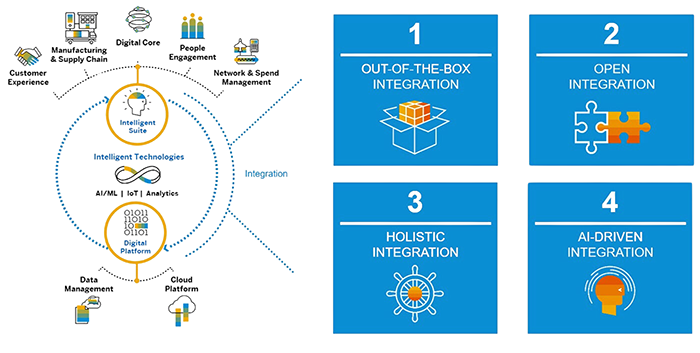 SAP integrates all data in business operations on the comprehensive system
SAP integrates all data in business operations on the comprehensive system
For instance, FRIWO Vietnam has applied a robust "digital backbone" by the SAP solution, which was consulted and executed by Citek. This project encompasses ten subsystems with a heading for a comprehensive management system.
3.2 Lower cost
SAP solutions are a cost-effective choice for businesses, empowering them to optimize operational expenditures. By providing accurate and up-to-date data, complemented by robust analytical tools, SAP enables organizations to gain an overall understanding of their costs and evaluate the efficacy of their operations. With a flexible and open architecture, the user can easily customize the solution to align with their specific requirements and scope of utilization, further enhancing cost savings.
 SAP applications help businesses manage budgets optimally
SAP applications help businesses manage budgets optimally
For instance, SAP solutions are implemented across various stages of production, from estimating raw material costs upon order placement to real-time forecasting and monitoring inventory levels. This approach reduces the ability to overproduce, optimizes production expenses, and guarantees that inventory levels are consistently maintained at an optimal balance.
3.3 Data Protection
Currently, most SAP solutions are designed to operate on secure platforms and adhere to strict international security standards such as ISO/IEC 27001. The system automatically updates SAP's most advanced security technology to the latest version for users.
 SAP solutions all use the most advanced security technology
SAP solutions all use the most advanced security technology
In addition, SAP allows users to assign access permissions within the system according to different organizational levels, enabling employees to utilize certain customized functions tailored to their work.
3.4 Enhancing Connection
Previously, data was stored fragmented across multiple applications, making it difficult for employees to access and share information. Moreover, duplicating data across various departments increased the cost of storing IT resources and raised the risk of data redundancy and error occurrence.
 SAP solutions all use the most advanced security technology
SAP solutions all use the most advanced security technology
By integrating data on a single system, SAP facilitates the efficient flow of information within the enterprise and enhances the seamless coordination between departments, creating a flexible working environment.
3.5 Enhancing Performance
With SAP solutions, businesses can confidently streamline their operations. These solutions significantly reduce manual operations and minimize the occurrence of errors. For instance, SAP automatically updates accurate data on the system, shortening the time for calculating and processing orders and automating management and reporting processes. This contributes to increased business efficiency, giving businesses the reassurance they need to operate smoothly and effectively.
4. Applications of SAP in Businesses
SAP ERP meets the comprehensive management needs of businesses across various fields and industries, from large enterprises and multinational corporations to SMEs. In recent years, an increasing number of Vietnamese enterprises have chosen to implement the SAP system to open the door to continuous innovation and strong growth in the future.
Some common ways of SAP solutions today include SAP S/4HANA, SAP Business One, and SAP Analytics Cloud (SAC).
SAP S/4HANA
SAP S/4HANA is the latest and most representative ERP version of SAP, built on the in-memory computing technology platform, which helps accelerate the processing of huge data volumes. Fully deployed on the cloud, combined with AI, machine learning, and data analytics technologies, SAP S/4HANA offers a breakthrough approach to enterprise resource management, with functions such as financial management, human resources, supply chain management, and many other features.
Find Out More About SAP ERP:
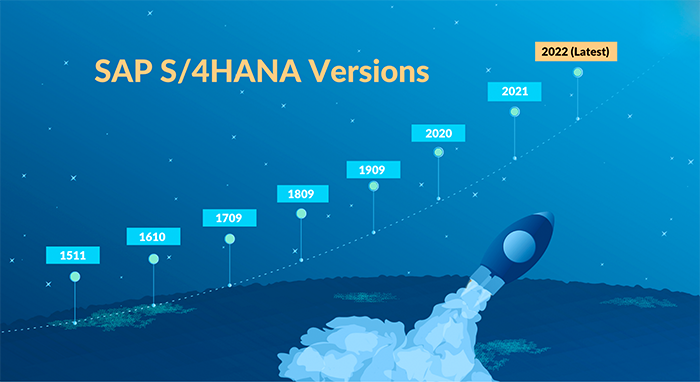 SAP S/4HANA is a business management system with many improvements compared to previous versions of SAP ERP
SAP S/4HANA is a business management system with many improvements compared to previous versions of SAP ERP
SAP Business One
SAP Business One is an SAP ERP solution developed for small and medium-sized enterprises (SMEs). It integrates over 30 functions, such as financial management, inventory management, sales management, etc. SAP Business One offers simplicity, flexibility, and easy customization to meet each business's unique needs.
SAP Analytics Cloud (SAC)
SAP Analytics Cloud (SAC planning) is a comprehensive enterprise planning solution based on cloud computing technology, following the SaaS (Software as a Service) model. SAC enables users to combine data from various sources, perform advanced data analysis, and make future trend predictions to guide business operations.
SAP offers many other solutions such as SAP Business ByDesign, SAP Success Factors, SAP Integrated Business Planning (SAP IBP),...
5. Q&A about SAP ERP solution
5.1 What is the origin of SAP name?
SAP is an acronym derived from the company's original German name, "Systemanalyse Programmentwicklung," which translates to "System Analysis Program Development" in English.
5.2 How we distinguish between SAP and ERP?
Enterprise Resource Planning (ERP) is a general term used to refer to ERP systems designed to enhance business operations and support comprehensive management through the integration of data within a singular system. In contrast, SAP represents a specific suite of ERP solutions developed by the eponymous company.
 Difference between the two terms ERP and SAP
Difference between the two terms ERP and SAP
5.3 Why is SAP the most applied solution in the world?
SAP is currently the most widely used ERP application, owing to its efficiency, flexibility, and comprehensive data integration capabilities, making it suitable for all types of businesses. Furthermore, SAP solutions are continually updated and developed with new features, incorporating advanced technologies such as artificial intelligence and the Internet of Things (IoT), helping businesses maintain innovation and competitive ability in domestic and international markets.
6. Citek - SAP's official partner in Vietnam
Citek is a consulting and implementation enterprise for comprehensive digital transformation ERP solutions, including Oracle NetSuite and SAP, for medium and large reputable businesses in Vietnam. With 15 years of practical experience in successfully deploying SAP solutions to several major enterprises such as Honda Vietnam, An Cuong Wood, Loc Troi Group, Hoa Phat Dung Quat Steel, Digiworld, etc., Citek is also the sole partner in Vietnam to be honored by SAP as the SAP S/4HANA Partner of The Year 2020 and the fastest-growing partner of SAP in the Asia-Pacific region in 2019.